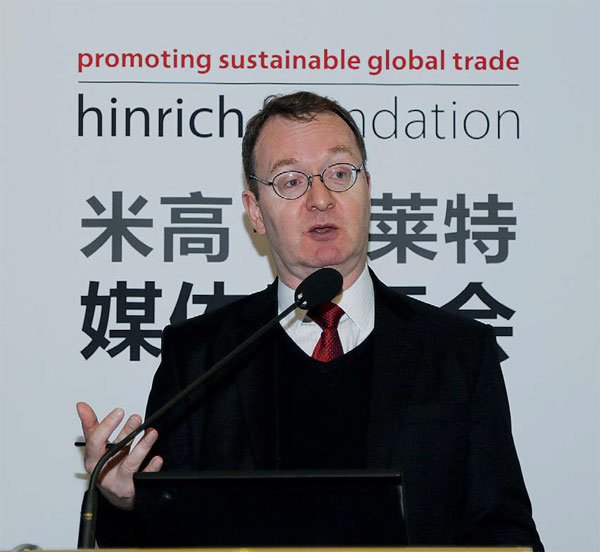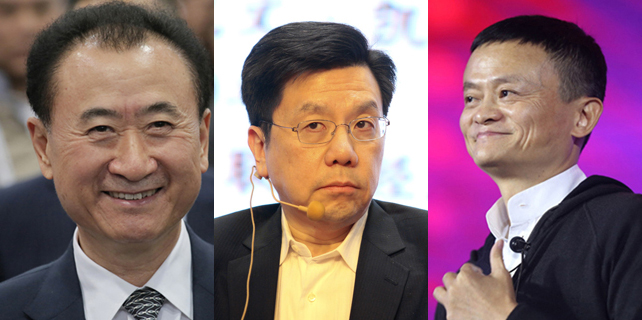Foreign links key to future success
|
Michael Enright, at the launch ceremony for his new book in Beijing. Provided to China Daily |
Overseas partnerships offer lucrative and beneficial opportunities for both sides, says veteran consultant
Many countries should look to China's successful record of attracting foreign investment and using it to help develop its economy, a veteran consultant says.
Michael Enright, director of the Hong Kong-based strategy consultancy Enright, Scott & Associates, says there are some important lessons for other countries to learn from China. He was in Beijing recently launching his new book, Developing-China: the Remarkable Impact of Foreign Direct Investment, which demonstrates the enormous impact that FDI has on China.
The first lesson for other countries to learn is that foreign investment can be a very powerful engine for development, Enright says.
Second is that using foreign investment as an engine of development can be managed, but a country has to develop not only capabilities in the workforce but also must develop the administrative and governmental capabilities to administer and manage a more advanced economy that includes foreign-invested enterprises.
The book says that FDI accounts for only a bit over 2 percent of China's gross capital formation. But if the FDI and the operations of foreign investment enterprises and the ripple effects of the supply chains and employee spending are also counted, the impact is 33 percent of China's GDP.
Enright thinks that estimate is still low.
He said the spillover effect of foreign investment is uncountable. For example, its impact on Chinese companies through the transfer of technology, the adoption of modern management techniques, and the training of tens of thousands of Chinese professionals through corporate training and university programs based on a Western model.
Foreign enterprises also help create distribution and supplier networks in China; help educate tens of thousands of professionals; give Chinese companies access into international markets (as foreign enterprises carry 75 percent of all of China's international cargo); bring in world-class environmental standards; and cooperate on social responsibility standards.
Enright says that when China started its reform and opening up in the 1980s, its economy lagged behind many other countries. A smart thing China did rather than trying to reinvent all the business models and technologies to develop a more advanced economy by itself was to attract good ideas and good companies from around the world to China.
The country has its own historical circumstances, and has recognized that to develop its economy, all the good ideas cannot come from one place. It really needs to tap into global ideas, global sources of capital and global expertise, Enright says.
Moreover, China has enormous potential with its large population, as well as its skills and capabilities, he says.
In Enright's view, China's use of foreign capital has been managed carefully, step by step, to absorb foreign investment without experiencing many of the potential downsides.
Although there are some foreign companies that think China has not opened up enough, he says any country would open only as much as it is comfortable with. What most foreigners don't understand is that given China's unique history, from the late 1950s to late 1970s, included basically no foreign investment. So when it started to open up, it had to gradually create the necessary administrative, regulatory and legal frameworks to support it.
But the more a country opens, the more investment and high-quality investment it can obtain, so China should be more confident and open to additional foreign investment, Enright says.
While foreign investment benefits China, he says China has also brought many things to foreign investors. One of those has been the market.
The stereotype outside China is that foreign companies come to China to make things with cheaper labor to send back overseas. That was true in the 1980s and maybe the first half of 1990s, he says. But foreign companies are now primarily in China to sell to China. Foreign companies sell far more in China than they export from China.
Enright says that China did offer relatively inexpensive labor to the world in the early days of its opening-up, but that is changing. Increasingly, multinational companies are putting R&D facilities and their most advanced manufacturing facilities in China.
In the old days they were looking for low-cost labor. Now they are looking for highly qualified labor, for skilled professionals, skilled scientists and that helps the companies, and it helps develop the Chinese economy as well, he says.
Foreign companies in the past made their plans based on 10 percent annual GDP growth; now they have to adjust, he added. At the same time, Chinese companies have become more experienced and can better identify their markets and use high-class technology, which results in tougher competition in the domestic market.
Those are two main mechanisms that will cause the multinationals to rethink, he says.
Enright says China still has great potential, but many foreign companies haven't realized it yet. He took the Belt and Road Initiative as an example, as it will cover a large population in more than 60 countries.
It is a massive opportunity, and the potential is not only China but also Southeast Asia, South Asia, Central Asia and Europe, because it proposes to build so much connecting infrastructure, he says.
He says that the Chinese government has recognized that it is impossible for Chinese companies and Chinese financial institutions to do all the projects all by themselves, and certain technology and expertise will be required from foreign partnerships. In addition, many of the places along the Belt and Road are not places where Chinese companies have experience, but foreign companies do and that provides good opportunities for partnerships, too.
But the key is: To partner successfully outside China, those companies also have to be partnering with the part that is inside China, Enright says.
For China's Manufacturing 2025 strategy, if you look at the leading technologies behind advanced manufacturing, the complete factory of automation systems, the internet of things, machine-to-machine communication systems right now the leaders in many of the technologies are outside of China, he says.
If China really wants to develop to be the world's leading advanced manufacturing center, a lot of cooperation with foreign companies would be good and good business for the foreign companies, he says.
He says there is a great deal of confusion in the international community, because it is not clear what approach is best to get involved. There is also some fear that many initiatives might be exclusive to Chinese companies so it is best if China can work out the details soon.
Enright says that as Chinese companies go international, there will be more need of mutual understanding over the next few years about what Chinese companies are allowed to do in foreign countries and what foreign companies are allowed to do in China.
China became a major exporter, but with relatively few Chinese companies actually understanding the international market. And that is going to be one area in which working with foreign companies or allying with foreign companies is going to be critically important, he says.
chenyingqun@chinadaily.com.cn










